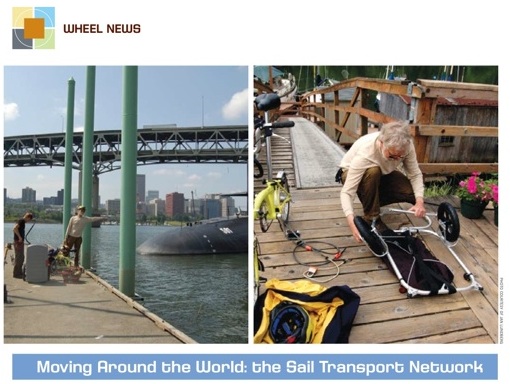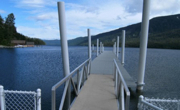Editor's note: "Moving Around the World: the Sail Transport Network" is a new article in the relatively new magazine Bicycle Times. The publishing team also puts out the mountain biking magazine Dirt Rag. Seeing sail transport as an extension of biking is a smart way to anticipate the future. People imagine life without the internal combustion engine and cars, but do they also see ways around trucking and ocean-going freight relying on polluting, dwindling oil?

photos of Jan Lundberg by Jeff Gerritsen
You may already have begun to use a bicycle more for your
own personal transportation needs, but have you ever thought
about connecting cycle power with other renewable-energy
vehicles to create a petroleum-free global trade network? Jan
Lundberg has. Lundberg is the founder of Culture Change, a
nonprofit dedicated to reducing petroleum dependence. One
longstanding goal of his is now coming into fruition with the
Sail Transport Network (STN), begun in the Puget Sound to serve
Seattle. STN activists are now launching projects in a handful
of other parts of the U.S. and Canada. In Portland, Oregon, the
immediate venture is to deliver malted grain to a local brewery,
then deliver the finished product to happy consumers, using a
combination of wind and pedal power.
“Sail Transport Network is paradoxically one of the simplest,
clearest initiatives that ever saw slowness and frustration in such
a way for so long in these urgent times. But I'm still here! The
idea originated in the late '90s and had its first attempt in 1999-
2000 in the Puget Sound. Cheap oil did us in, pretty much until
2006; between times it was a minimal web presence. Now I can
report that we've come a long way,” says Lundberg.
Lundberg has been inspired by the Sail Transport Company,
which has been delivering vegetables and honey to points
around Puget Sound, Washington, for two seasons. In 1997, in
Humboldt County, California, his group Alliance for a Paving
Moratorium began Pedal Powered Produce, a cargo-bike delivery
service for local produce. Combining these two modes has a
lot of potential to move goods across considerable distances,
especially as more people get involved.
“A fully operational STN (for more than the Puget Sound and
Portland's brewing scene) will happen when the idea of using
available sail boats for practical purposes—enhancing food
security and passenger service—occurs to the average sailor
and yacht owner in more than a few localities (as is the case at
present),” Lundberg explains. “Higher petroleum prices and oil
shortage might have to occur first. For we have done much to
prepare, propose and publicize while the oil's flowing.”
STN’s big goals go far beyond Portland. “Future plans include
bringing cacao (basis of chocolate) and coffee from the tropics to
the Pacific Northwest and the U.S. Gulf Coast. Think of the U.S.
coffee and chocolate addicts getting their fixes guilt-free over
both climate concern and oil consumption! Of course, waterways
are necessary because the Pedal Power Produce component of
STN can't go hundreds of miles inland. But as you know, over
a hundred yeas ago and from time immemorial there was trade
of such goods even far inland. It will come back.”
To find out more and to get involved, go to SailTransportNetwork.com

Kevin Nierman, artist



